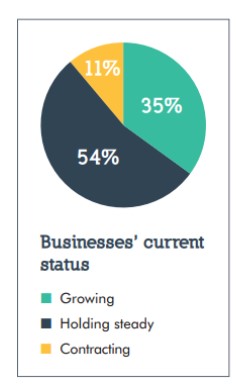Business Association Launches Campaign Urging Candidates to "Fix Connecticut"
/Connecticut’s largest business association is launching a statewide advertising blitz to exert its voice in the political debate in the aftermath of the state’s primaries as the focus turns to the November elections. CBIA will on focus on raising public awareness of what it describes as the critical issues and challenges impacting the state's economic future and job growth.
The campaign, called “Fix Connecticut” will include digital, broadcast, and print advertising and will run into the 2019 General Assembly session and beyond, officials said. It includes a website, fixconnecticut.com, and a video that acknowledges some progress made since the 2016 election, noting that "our state's economy is better than it was," but stresses that "we have a long way to go."
“High taxes, job growth, and a sluggish economy are the top concerns for Connecticut residents and must be priorities for lawmakers and candidates for elected office," CBIA president and CEO Joe Brennan said, echoing the video's urging "we need lawmakers that have a plan" to make the state more affordable, cut state spending and "help us compete with other states in the region."
The advertising campaign may also serve as a precursor to anticipated endorsements of candidates by CBIA in statewide and local legislative races. In 2016, CBIA endorsed candidates in 22 of 36 State Senate races, urging the election of 4 Democrats and 18 Republicans. There were also endorsements made in 85 of 151 House districts, including 23 Democrat and 62 Republican candidates. Those endorsements came in mid-September two years ago.
“Lawmakers and candidates must understand what really matters to Connecticut and we want residents to understand how critical these issues are to the state's economic future,” Brennan added. “We want to make sure those issues are front and center during what we believe is a make-or-break time for Connecticut.
 The Fix Connecticut campaign centers on a five-point plan that outlines key policy steps designed to remove barriers to economic growth and leverage the state's many strengths, according to CBIA:
The Fix Connecticut campaign centers on a five-point plan that outlines key policy steps designed to remove barriers to economic growth and leverage the state's many strengths, according to CBIA:
- Prioritize Economic and Job Growth. Help businesses compete for talent, expand private-public workforce development initiatives, and continue strengthening high school and college programs to meet the needs of our 21st century economy. The best way to solve the state's fiscal problems is to grow the economy.
- Cut State Spending. Reduce the size and cost of government, privatize appropriate state services, expand the use of non-profit agencies, and put the brakes on spiraling overtime costs.
- Make Connecticut More Affordable. That starts with lowering taxes. Connecticut's personal income, business, and property tax burden is one of the highest in the country—a key factor behind the state's population decline, including the loss of billions of dollars in income.
- Reform the State Employment Retirement System. Align state employee compensation and benefits with Northeast states' public sectors and the private sector and end the use of overtime in calculating pensions.
- Improve Connecticut's Business Climate. Reject costly, burdensome workplace mandates, cut unnecessary red tape, block new taxes and fees that drive up healthcare costs, reform the state's unemployment compensation system, and overhaul transportation infrastructure.
"State lawmakers' actions have a far greater impact on our daily lives, our workplaces, and our economy than decisions that are made at the federal level. With so much attention on national politics, we cannot lose sight of the critical issues impacting Connecticut,” Brennan pointed out, noting that the campaign will complement CBIA's advocacy efforts during the next legislative session, which begins in January.
https://youtu.be/1UTTqLaVpUI


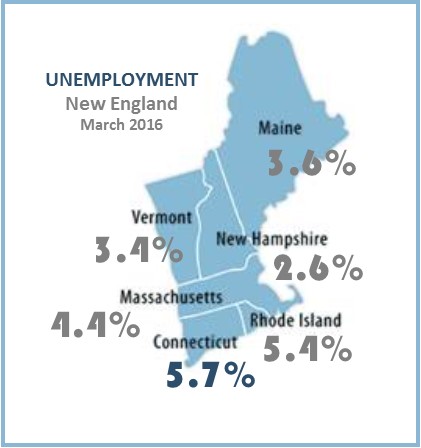 Thirty-six states including Connecticut (and the District of Columbia) had unemployment rate decreases from a year earlier, 12 states had increases, and 2 states had no change.
Thirty-six states including Connecticut (and the District of Columbia) had unemployment rate decreases from a year earlier, 12 states had increases, and 2 states had no change.
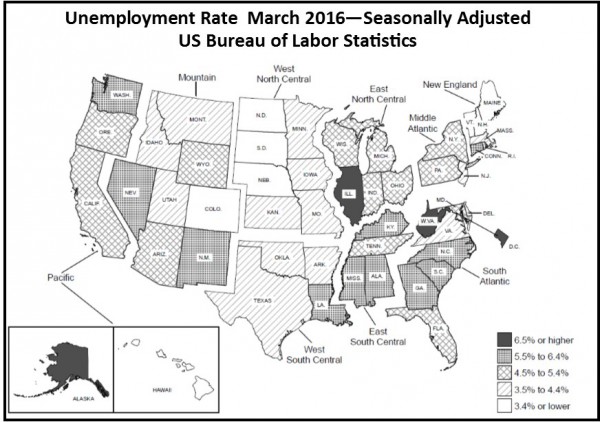

 In addition, the marketing campaign also highlights that thee of the top 10 fastest growing companies headquartered in Connecticut in 2014 were healthcare related companies, and that Connecticut’s healthcare sector has the fifth highest number of sole proprietorships of any sector in the state, with the seventh highest revenues. Connecticut’s “unique base of health sector assets” include health insurance companies, hospitals, medical schools, research capacity, and specialty practices, according to the organization’s website.
In addition, the marketing campaign also highlights that thee of the top 10 fastest growing companies headquartered in Connecticut in 2014 were healthcare related companies, and that Connecticut’s healthcare sector has the fifth highest number of sole proprietorships of any sector in the state, with the seventh highest revenues. Connecticut’s “unique base of health sector assets” include health insurance companies, hospitals, medical schools, research capacity, and specialty practices, according to the organization’s website. 
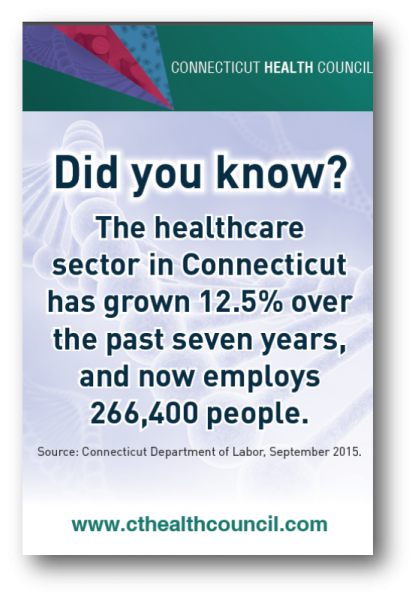 The Council's primary activity is to host programs focused on health sector topics that feature speakers of regional, national and international renown, the website points out. The Council also provides “a forum for a robust network of experts, professionals and other parties interested in promoting Connecticut as a center of health excellence and the health sector as a primary driver of economic and employment growth in our State.”
The Council's primary activity is to host programs focused on health sector topics that feature speakers of regional, national and international renown, the website points out. The Council also provides “a forum for a robust network of experts, professionals and other parties interested in promoting Connecticut as a center of health excellence and the health sector as a primary driver of economic and employment growth in our State.”
 Since entering the Connecticut market in the summer of 2014, the company has been aggressively growing its customer base in a competitive market while working diligently to grow and expand its network of doctors. Harvard Pilgrim Health Care announced recently that its Connecticut membership has grown to more than 24,000, exceeding expectations for 2015. It now serves more than 800 Connecticut businesses. Twenty-nine of the state’s 30 hospitals are now in-network.
Since entering the Connecticut market in the summer of 2014, the company has been aggressively growing its customer base in a competitive market while working diligently to grow and expand its network of doctors. Harvard Pilgrim Health Care announced recently that its Connecticut membership has grown to more than 24,000, exceeding expectations for 2015. It now serves more than 800 Connecticut businesses. Twenty-nine of the state’s 30 hospitals are now in-network. With more than 500 business leaders in attendance at an annual Economic Summit & Outlook last week, brought together by the Connecticut Business and Industry Association and MetroHartford Alliance, Schmitt spent some time touting a new model launched in the state of New Hampshire that he believes may be a glimpse into the direction the industry is moving. Harvard Pilgrim Health Care’s footprint in New England now covers “where 90 percent of New Englanders live,” in Massachusetts, Connecticut, Maine and New Hampshire.
With more than 500 business leaders in attendance at an annual Economic Summit & Outlook last week, brought together by the Connecticut Business and Industry Association and MetroHartford Alliance, Schmitt spent some time touting a new model launched in the state of New Hampshire that he believes may be a glimpse into the direction the industry is moving. Harvard Pilgrim Health Care’s footprint in New England now covers “where 90 percent of New Englanders live,” in Massachusetts, Connecticut, Maine and New Hampshire. 
 Launched
Launched





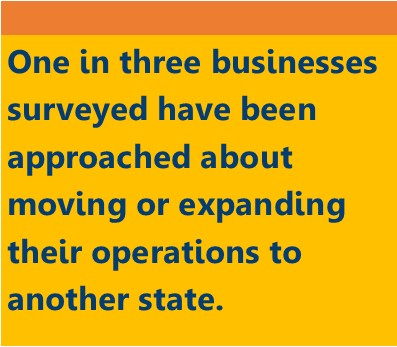 Whether perception drives reality or reality is drives perception, the opinions stated by business surveyed are less than encouraging, according to the report. Primary reasons cited for moving or expanding outside Connecticut are the state’s high costs (including taxes) and its “anti-competitive business environment,” reflecting an oft-stated CBIA viewpoint. More than three-quarters say Connecticut’s business climate is subpar compared with other states in the Northeast, and the nation.
Whether perception drives reality or reality is drives perception, the opinions stated by business surveyed are less than encouraging, according to the report. Primary reasons cited for moving or expanding outside Connecticut are the state’s high costs (including taxes) and its “anti-competitive business environment,” reflecting an oft-stated CBIA viewpoint. More than three-quarters say Connecticut’s business climate is subpar compared with other states in the Northeast, and the nation.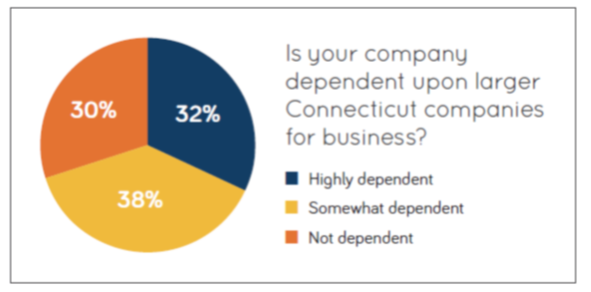


 aring workers for higher-level jobs is not quite as strong, the majority of respondents nonetheless believe Connecticut schools and colleges provide an adequate education for mid-level employees (59% of employers surveyed); management workers (61% of employers); and executive-level employees (58%).
aring workers for higher-level jobs is not quite as strong, the majority of respondents nonetheless believe Connecticut schools and colleges provide an adequate education for mid-level employees (59% of employers surveyed); management workers (61% of employers); and executive-level employees (58%).

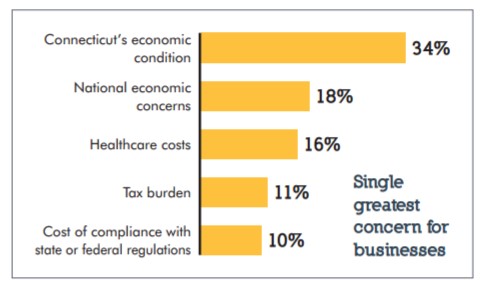 When asked how Connecticut should address the shortage of skilled workers, 32% of businesses surveyed say the state should reduce the cost of living, 28% say the state should support trade schools, 20% say the state should support education overall, and 20% say there should be incentive for training programs.
When asked how Connecticut should address the shortage of skilled workers, 32% of businesses surveyed say the state should reduce the cost of living, 28% say the state should support trade schools, 20% say the state should support education overall, and 20% say there should be incentive for training programs.